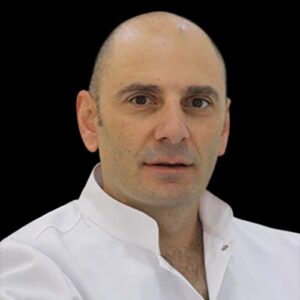
Health from the stomach to the liver - our mission
Gastroenterology or gastroenterohepatology is a branch of internal medicine that deals with the diagnosis, treatment and monitoring of diseases of the digestive system, consisting of the esophagus, stomach, duodenum, small and large intestine and rectum, liver, gallbladder with bile ducts and pancreas (pancreas).
Frequently Asked Questions
The most common symptoms that lead the patient to a gastroenterohepatologist abdominal pain, nausea, vomiting, difficulty and / or painful swallowing, heartburn, belching, hiccups, bloating, changes in intestinal discharge (diarrhea or constipation), the appearance of blood in the stool, weight loss. The most common, but not exclusive laboratory findings for which patients come to gastroenterohepatologists are anemia (anemia) and elevated liver enzymes (transaminases), alkaline phosphatase and gamma glutamyl transferase, as well as pancreatic enzymes (amylase and lipase).
Of the stool findings, the most significant are fecal calprotectin, occult bleeding test from the stool, fecal test for Helicobacter Pylori and microbiological stool tests (coproculture, stool testing for parasites, fungi and Clostridioides difficile.
Gastroenterological examination involves a conversation with a specialist in gastroeneterohepatology about the symptoms, previous diseases, insight into medical records and therapy.
Modern gastroenterohepatology implies endoscopic and ultrasound diagnostics, as an indispensable part of the examination of diseases of the digestive organs. Endoscopic diagnostics include esophagogastroduodenoscopy (so-called gastroscopy) and colonoscopy.
In The Standard Polyclinic, endoscopic procedures are performed on the modern video system of the Olympus brand, which has been synonymous with the highest standard in endoscopic diagnostics for decades.
The device also has a so-called 'virtual chromoendoscopy', software that in the hands of an educated endoscopy physician is a powerful weapon for detecting even the earliest precancerous lesions, i.e. those changes that, if overlooked, can grow into a malignant tumor in a few years with all the consequences that this condition carries with it.
Endoscopic tests imply a certain preparation and are done with or without anesthesiological premedication, according to the patient's wishes. Detailed instructions for preparation during gastroscopy and colonoscopy can be obtained in writing at the Standard Polyclinic. Before each endoscopy, it is necessary to read in detail the instructions for preparation and sign the consent for each endoscopic procedure.

Velimir Milošević
Dr. Sci. Med.
Dr. Sci. Med. Velimir Milošević conducts diagnostic and therapeutic endoscopic examinations of the upper and lower parts of the digestive tract (gastroscopies and colonoscopies using optic chromoendoscopy for early detection of precancerous lesions), including mechanical and thermal hemostasis (bleeding control), endoscopic ligation of varices of the esophagus and blood vessels of the stomach, removal of all types of polyps (polypectomy and mucosectomy), balloon dilation of narrowing in the esophagus in the large intestine, placement of stents in the digestive tube, placement of percutaneous gastrostoms... He routinely performs ultrasound examinations of the abdomen for which he was additionally educated at the University Clinical Center in Maribor where he started education in the field of endoscopic ultrasound. He is the only gastroenterologist in Montenegro performing endoscopic treatment of bile duct disease (ERCP). He has a number of years of experience in working with outpatient and hospital patients in all fields of gastroenterohepatology.
About Doctor
Dr. Sci. Med. Velimir Milosevic graduated at the Faculty of Medicine in Belgrade in 2000 with an average grade of 9.3. He received his master's degree at the Faculty of Medicine in Kragujevac in 2005. He completed his specialization in Internal Medicine at the Faculty of Medicine in Belgrade in 2006 and the subspecialty in gastroenterohepatology at the same faculty in 2008. He spent ten months in 2011 at Policlinico Gemelli in Rome, Italy, where he was educated for endoscopic retrograde holangiopancreatography (ERCP) under the mentorship of Professor Guido Kostamana. He defended his doctoral dissertation in the field of colorectal cancer in 2015 at the Faculty of Medicine in Kragujevac. The right to work in the United Arab Emirates (DHA license) was exercised after the successful Prometric testing in 2017. Since 2019, he is a licensed gastroenterologist and a member of the Slovenian Medical Chamber. In September 2021, he attended an education in Koc hastanesi, Istanbul, Turkey, where he was trained by Professor Fatih Aslan for endoscopic submucosal dissections, the most complex endoscopic procedurefor eliminating complicated polyps in the colon.
Work engagement
He was employed at the Clinical Center of Montenegro as a gastroenterohepatologist until 2018. During that period, he also worked as an expert consultant at the General Hospital Bar. For a number of years he was also an assistant at the Faculty of Medicine of the University of Montenegro. After that, he worked in private sector, and then at the University Clinical Center Maribor in Slovenia as a gastroenterohepatologist and supervisory endoscopist for younger gastroenterologists. From July to December 2021, he worked at the General Hospital in Nikšić. He is an author and co-author of numerous papers published in international journals as well as a lecturer at numerous professional symposia. Member of the European Endoscopic Association (ESGE).
He speaks English, Italian and Slovenian.
